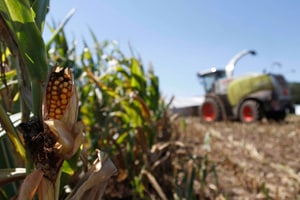
Monsanto has filed suit to block California’s Office of Environmental Health Hazard Assessment (OEHHA) from listing the herbicide glyphosate—the main ingredient in the herbicide Roundup—as a chemical known to cause cancer under California’s Proposition 65. Roundup is one of the most widely used chemicals in the world, both in commercial agriculture and home gardens. Monsanto […]
 Monsanto has filed suit to block California’s Office of Environmental Health Hazard Assessment (OEHHA) from listing the herbicide glyphosate—the main ingredient in the herbicide Roundup—as a chemical known to cause cancer under California’s Proposition 65. Roundup is one of the most widely used chemicals in the world, both in commercial agriculture and home gardens.
Monsanto has filed suit to block California’s Office of Environmental Health Hazard Assessment (OEHHA) from listing the herbicide glyphosate—the main ingredient in the herbicide Roundup—as a chemical known to cause cancer under California’s Proposition 65. Roundup is one of the most widely used chemicals in the world, both in commercial agriculture and home gardens.
Monsanto challenged the legal mechanism behind the proposed listing, saying it was “virtually automatic” after the WHO’s International Agency for Research on Cancer found that glyphosate is probably carcinogenic, Law360 reports. The process denies the company due process, Monsanto claims. Monsanto told the court, “OEHHA effectively elevated the determination of an ad hoc committee of an unelected, foreign body, which answers to no United States official (let alone any California state official), over the conclusions of its own scientific experts.”
California voters passed Prop. 65 in 1986, in an effort to keep chemicals that cause cancer, birth defects, or reproductive harm out of the drinking-water supply. Businesses must post a warning when their operations or product will expose people to chemicals on the list. The law provides several mechanisms under which a substance can be added, according to Law 360.
Monsanto alleges that part of the state’s Labor Code that cites IARC findings as a basis for Prop. 65 listings violates the California and U.S. constitutions. Monsanto told the court that regulators and scientists who have studied the herbicide over its 40 years of use have not found an associated cancer risk. Evaluators have included the OEHHA itself. In 1997 and again in 2007 OEHHA concluded that glyphosate is not likely to pose a significant cancer risk to humans, according to Law360. Phil Miller, vice president of regulatory affairs at Monsanto, characterized the agency’s proposed listing is “contrary to science.” He called IARC’s conclusion “erroneous, non-transparent and based on selectively interpreted data.”
In 2015, the International Agency for Research on Cancer (IARC) of the World Health Organization (WHO) classified glyphosate as “probably carcinogenic to humans,” the New York Times reported. The agency made the determination based on studies of glyphosate exposure in the United States, Canada, and Sweden since 2001. “Probably carcinogenic” is a more serious designation than “possibly carcinogenic.”
Glyphosate has been linked to cancers, including leukemia (multiple myeloma, myeloma), lymphoma (non-Hodgkin’s, Hodgkin’s), and to Parkinson’s disease. In addition, glyphosate has been linked to serious health issues. It has been shown to cause respiratory distress, impaired consciousness, pulmonary edema, arrhythmias, and renal failure, according to a 2004 study published in Toxicology Review.
In response to the IARC designation, France banned the sale of Roundup at garden centers and an area in the Argentine province Entre Rios is demanding action on its high cancer death rates. Residents blame heavy use of Roundup on rice and soybean fields for a cancer death rate far above the national average.
Law360 reports that a Hawaiian farmer and a former California field worker cited the IARC determination in lawsuits alleging Roundup caused their cancers. Monsanto has asked for both cases to be dismissed.


